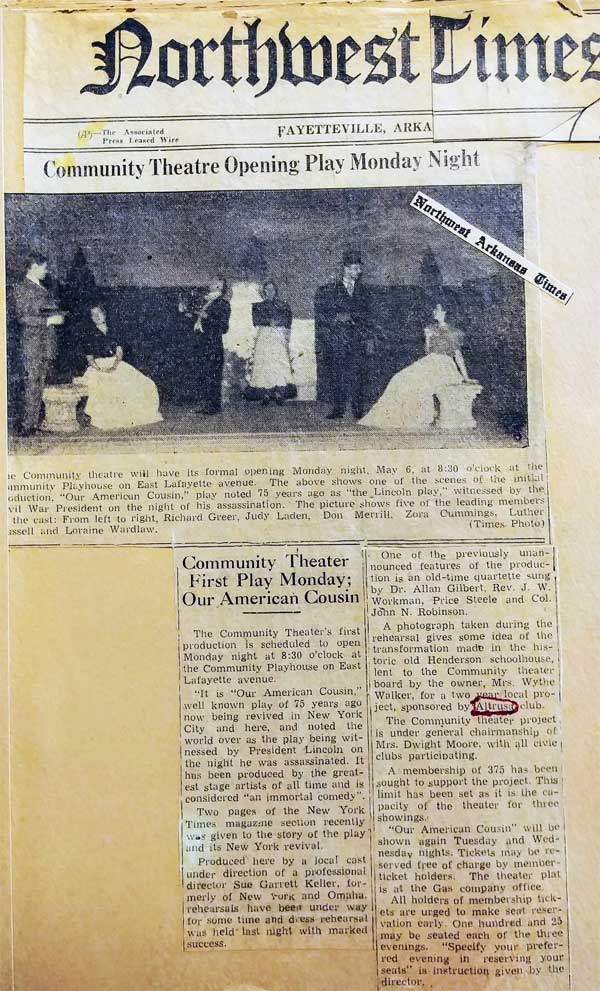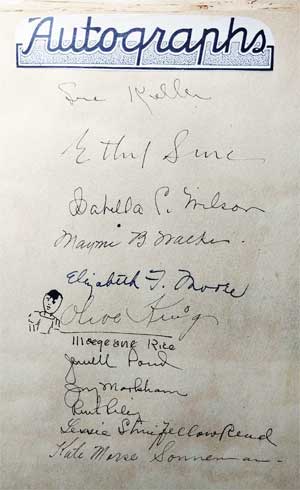Joy Pratt Markham, Altrusa, and
Fayetteville's First Community Theatre
How are Joy Pratt Markham, Altrusa, and Fayetteville’s first community theatre related? Altrusa International of Fayetteville, Arkansas, Inc., also called the Altrusa Club of Fayetteville, is a non-profit organization with the goal of making their local community better through leadership, partnership, and service. It was organized on November 27, 1939 and was chartered on February 1, 1940. It is now 80 years old and still going strong. Forty years ago, the Fayetteville Northwest Arkansas Times on November 26, 1980 wrote about their 41st anniversary luncheon: “Mrs. [Marilynn] Bell presented a history of the 41 years of the Fayetteville Altrusans. Organized in 1939, the Altrusa Club of Fayetteville is the second oldest in the state. There were nine charter members: Sue Garrett Keller, president, Mrs. Dwight Moore, Ruth Riley, Joy Markham, Mrs. Frank Moore, Olive King, Mrs. W. F. Sonneman, Mrs. Lessie Stringfellow Read, and Jewell C. Pond. The first service project was the Community Playhouse which operated for four seasons and was discontinued because of World War II. The proceeds from the playhouse were presented to the Theatre Arts Department of the University of Arkansas to establish a scholarship fund for outstanding students. Altrusans sponsored the first blood bank in Arkansas; aided in providing tennis courts at Wilson Park; established the “Story Telling Hour” at the city library, making a contribution to the library in Roberta Fulbright’s honor. Mrs. Fulbright was a member of Altrusa. Altrusans have sponsored recipients of the Founders Fund Vocational Aid, helping 20 women receive training in a skill to enable them to become self-supporting or to improve their earning capacity”.
The list goes on of the many service projects done by the Altrusa Club of Fayetteville over the years. As a founding member, Joy Pratt Markham served as chairman of the Reading Committee for the Community Playhouse and chairman of the Education Committee which also consisted of Jewell Pond and Mabel Asbury. Joy served on numerous committees over the years, as did the other founding members. Some of the Altrusa Club’s meetings were held at Hilltop Camp, Joy’s home on Markham Hill.
Let’s take a closer look at Fayetteville’s first community theatre.
Northwest Arkansas Times, January 26, 1940
A community theatre will be sponsored by Altrusa International, it was voted by the new civic club at its business meeting held last night at the women’s Civic club rooms. Altrusa is a club limited to business and professional women executives for the purpose of promoting worthwhile civic projects, art, education, and vocational guidance to women and girls.
Northwest Arkansas Times, May 7, 1940
Fayetteville has taken another big step forward in attaining those things proven to be cultural and socializing. She has successfully launched her own Community theatre. Appeal of dramatics is as old as the ages. “Let’s play” are almost the first connected words of the small child, and the “will to play” persists as long as life lasts. Before Shakespeare, the play was the thing. It always will be. Most reforms have come about by being presented through irony, humor, or farce from behind footlights that illumine more than the actors’ faces. All of the arts are employed in theatricals. The dramatic guild is greatest of all guilds in the offering of a varied vocational guidance.”
Brief history of Fayetteville’s Community Playhouse,
by Lessie Stringfellow Read
(written on the back of The Playbill, Community Playhouse, April 14, 15, 16, 1941)
“April 14, 1941 is recorded as the first birthday of Fayetteville’s Community Playhouse. The historic building, in which performances are presented, is much older than that. The Community Playhouse in its beginning, was sponsored as the first civic work of the Altrusa club. Announcement of the theatre’s sponsorship appeared in the local press as front-page news on January 26, 1940. Its possibilities were presented at a luncheon conference with other civic groups on February 20. Extensive publicity was given to the project and the Little Playhouse was secured for theatre use, through joint efforts of Mrs. Keller, Mrs. Moore, and Mrs. Wythe Walker on March 7."
"Plans included converting historic Henderson school, first Negro school in Arkansas, into a theatre. It is a beautiful little building made of handmade brick and through which in three quarters of a century, thousands of little black boys and girls – descendants of Fayetteville’s first families’ slaves – had passed since that historic day 75 years ago, when the building was dedicated to the cause that all people – black or white – are created equal and should have equal educational opportunity."
Ms. Read's history of the playhouse continued, "Actual construction of converting the building (lent by Mrs. Wythe Walker on a two-year lease, with privilege of purchase at the end of that time) began March 23. Membership in the Community Theatre was opened March 25, on Life, Patron, and Season Ticket membership bases. Cast for opening play was completed April 2, and on May 6, 7, and 8, “Our American Cousin” had its initial performance and a successful three-night run."
"Events since then have included: June 3, “To the Ladies” and “Never Too Old”, one-act plays; an outdoor garden party and fashion show; July 5, 9, Children’s Story Hours; July 29, Players Guild; Dec. 10, 11, and 12, “Night of January 16”; March 10, 11, and 12, 1941, (unreadable), “Tea With a Wicked Lady”, and “Suppressed Desire”, three one-act plays. The Birthday celebration April 14, 15, and 16, “Call it a Day” and May 11, 12, and 13, “The Importance of Being Earnest”, concludes the season."
Signatures of founding members"Mrs. Keller has directed all productions except one one-act play, which was directed by Lillian Baker. Betty Lighton, sister of Louis D. Lighton of Hollywood and daughter of the late noted author William R. Lighton, assisted the first season and conducted the children’s hour. Mrs. Moore throughout has served as chairman and president of the Playhouse. Well-launched and having proven its worth to the community, the theatre is a recreational center for cultural activities, providing vocational guidance in Theatre arts which means more fields than any other one of the arts, sciences, or crafts. In Sue Garrett Keller, the theatre has had superb dramatic direction which no small city could have purchased. In Elizabeth Moore, board chairman, it likewise has had professional talent money cannot buy."
"In so brief a history, it is possible to give credit to but a few of the many responsible for what the Community Theatre is today – a community-wide recreational center.”

